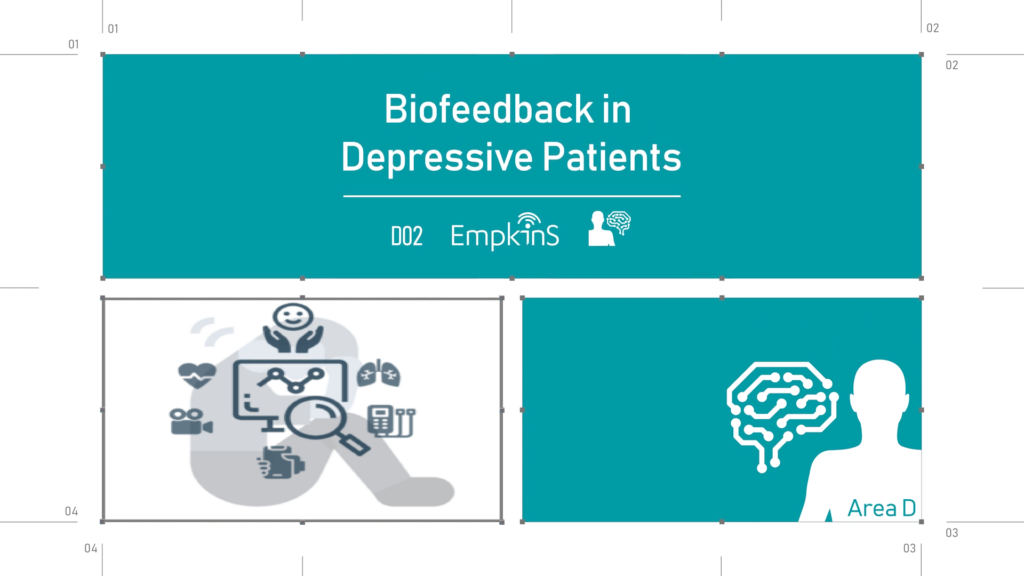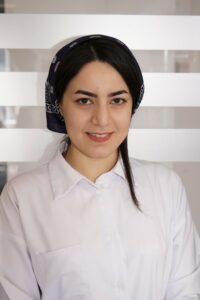Subproject D02
Subproject D02
Empatho-Kinaesthetic Sensor Technology for Biofeedback in Depressed Patients
The D02 project focuses on utilizing facial expressions as a biomarker in smartphone-based reappraisal training for psychological assessment. The project aims to understand the relationship between cognition, facial expressions, and affect as underlying mechanisms for the development and maintenance of depression. It highlights the lack of empirical studies on facial expressions and the need for quantifying and modifying them. The project presents a feasibility study on smartphone-based biofeedback Training for reducing depressive mood and suggests that this training could be a useful tool for individuals with depressive symptoms. It also proposes the establishment of empathokinaesthetic sensor technology and machine learning methods for the automatic detection and modification of Depression-associated facial expressions, posture, and movement. The mutual activation of depressogenic evaluation processes and depression-associated kinaesthesia is a significant factor in psychological information processing theories. It emphasizes the importance of understanding these underlying mechanisms in developing effective interventions for depression. Overall, the project provides insights into the potential of smartphone-based biofeedback training and machine-learning algorithms in detecting and treating depression.

Contacts
Prof. Dr. Matthias Berking
Principal Investigator
Prof. Dr. Björn Eskofier
Principal Investigator
Dr. Marie Keinert, M. Sc.
PostDoc
Lydia Rupp
Doctoral Candidate
Misha Sadeghi, M. Sc.
Doctoral Candidate
Amirreza Asemanrafat, M. Sc.
Associated Doctoral Candidate
Sharon Ernst, M.Sc.
Associated Doctoral Candidate
Malin Hager, M.Sc.
Associate Doctoral Candidate
Farnaz Rahimi, M. Sc.
Associate Doctoral Candidate
Prof. Dr. Bernhard Egger
Associated Member
Dr.-Ing. Robert Richer
PostDoc
Dr. Lena Schindler-Gmelch
Postdoc
Additional Information
- Balbach S., Dorn C., Schindler-Gmelch L., Berking M., Hagelauer A.:
Low-Power Wireless Multi-Channel Surface Electromyography Sensor for Facial Muscle Sensing.
IEEE Wireless and Microwafe Technology Conference (WAMICON), Cocoa Beach, Florida, 2025. - Hager M., Keinert EM., Berking M.:
STARK mit Depression: Ein multimodales Approach-Avoidance Modification Training für Jugendliche mit Depression – Ein Studienprotokoll
4. Deutscher Psychotherapie Kongress (Berlin, 2025) - , , , , , , , :
The EmpkinS-EKSpression Reappraisal Training Augmented With Kinesthesia in Depression.
JMIR Formative Research 9 (2025), Art.Nr.: e65357. ISSN: 2561-326X. DOI: 10.2196/65357 - , :
Declaring „war“ on stress: Preliminary results of a randomized controlled study investigating a speech-based approach-avoidance modification training targeting dysfunctional beliefs in individuals with elevated stress.
Vortrag auf dem 4. Deutschen Psychotherapie Kongress (Berlin, 2025) - , , , , , , , , , :
EmpkinS-EKSpression: Ergebnisse einer Randomisiert-kontrollierten klinischen Studie eines Emotions-gestützten Trainings zur Kognitiven Umstrukturierung
Vortrag auf dem 4. Deutschen Psychotherapie Kongress (Berlin, 2025) - , , , , , , , , , :
EmpkinS-EKSpression-BioFACEBack: Ergebnisse eines randomisiert-kontrollierten Trials zu gesichtsmuskelfokussiertem Biofeedback bei depressiven Erkrankungen.
Vortrag auf dem 4. Deutschen Psychotherapie Kongress (Berlin, 2025) - Ernst S., Krauss D., Moß M., Vossiek M., Eskofier B., Merking M.:
Affect during sleep: Exploring the capabilities of Artificial Intelligence in Sleep Research.
Proceedings of the International Medicine and Health Sciences Congress, 2024. DOI: 10.53375/imhsc.2024.117. - , , , , , , , , , , :
Facing depression: evaluating the efficacy of the EmpkinS-EKSpression reappraisal training. augmented with facial expressions – protocol of a randomized controlled trial
BMC Psychiatry 24 (2024), Art.Nr.: 896. ISSN: 1471-244X. DOI: 10.1186/s12888-024-06361-3 - , , :
Approaching depression: An emotion-enhanced approach-avoidance modification training targeting dysfunctional cognitions in adult depressin – Pilot study.
Poster auf dem 3. Deutschen Psychotherapie Kongress (Berlin, 2024) - , , :
Approaching depression: An emotion-enhanced approach-avoidance modification training targeting dysfunctional cognitions in adult depressin – Randomized controlled pilot study.
55. Annual International Meeting of the Society for Psychotherapy Research (Ottawa, 2024) - , , , , , , , :
Does stress stand a chance during sitting? Cortisol and subjective stress response to the (f-)TSST between sitting and standing body position.
Annual meeting of the American Psychosomatic Society (APS, Brighton, 2024)
- , , , , , , , :
Exploring the cortisol and subjective stress response to the TSST between sitting and standing body position.
Annual meeting of the European Health Psychology Society (EHPS, Cascais, 2024). - , , , , , , , :
f-TSST+: An extension to the friendly Trier Social Stress Test that enables better behavioral comparability during acute psychosocial stress.
DOI: 10.1016/j.psyneuen.2023.106862. - , , , , , , , , , , :
openTSST – An open web platform for large-scale, video- based motion analysis during acute psychosocial stress.
Jahrestagung Psychologie und Gehirn (PuG, Hamburg, 2024) - Rahimi F., Sadeghi M., Richer R., Capito K., Rupp L.H., Schindler-Gmelch L., Egger B., Berking M., Eskofier B.:
Depression Detection Perspectives Using Biomarker signals: Respiration, ECG and EMG.
Poster, 3. Deutscher Psychotherapiekongress (Berlin/Germany, 2024) - , , , , , , , , , , :
Machine learning-based detection of acute psychosocial stress from body posture and movements.
Scientific Reports 14 (2024), Art.Nr.: 8251. ISSN: 2045-2322. DOI: 10.1038/s41598-024-59043-1 - , , , :
Walking the Black Dog: A systematic review and meta-analysis on the effect of walking interventions on depressive symptom severity.
Mental Health and Physical Activity 26 (2024), Art.Nr.: 100600. ISSN: 1755-2966. DOI: 10.1016/j.mhpa.2024.100600 - , , , , , , , , :
Exploring the Capabilities of a Language Model-Only Approach for Depression Detection in Text Data.
Deutscher Psychotherapiekongress (Berlin, 2024) - , , , , , , , :
Harnessing multimodal approaches for depression detection using large language models and facial expressions.
npj Mental Health Research 3 (2024), S. 66. ISSN: 2731-4251. DOI: 10.1038/s44184-024-00112-8 - , , , , , , :
Realtime Laser Beam Steering and Calibration Method for Coherent Biomedical Distance and Motion Sensing.
CLEO: Science and Innovations, CLEO: S and I 2024 in Proceedings CLEO 2024, Part of Conference on Lasers and Electro-Optics 2024 (Charlotte, NC, USA, 2024) - , , , , :
Disgust-based approach-avoidance modification training for individuals suffering from elevated stress: A randomized controlled pilot study.
Stress and Health (2024), Art.Nr.: e3384. ISSN: 1532-2998. DOI: 10.1002/smi.3384 - Böhme S., Keinert M., Lu H., Capito K., Rupp L.H., Schindler-Gmelch L., Streit H., Heyder M., Eskofier B., Koelpin A., Merking M.:
Heart rate variability changes after an App-based stress-reduction training – a Pilot Study.
Poster, Psychologie und Gehirn (Tübingen, 2023). - Capito K., Schindler-Gmelch L., Böhme S., Rupp L.H., Richer R., Sadeghi M., Rahimi F., Abel L., Eskofier B. & Berking M.:
Efficacy of a smartphone-based Reappraisal Training against Depression and benefits of enhancing it with Facial Expression.
Poster, 2. Deutschen Psychotherapiekongress (Berlin, 2023). - , , , , :
Hair Cortisol Research in Posttraumatic Stress Disorder – 10 Years of Insights and Open Questions. A Systematic Review.
Current Neuropharmacology 21 (2023). ISSN: 1570-159X. DOI: 10.2174/1570159X21666230807112425 - , , , , :
Breathe your stress away. Preliminary results of a randomized controlled study investigating a breath-based approach-avoidance modification training in individuals with elevated stress.
Poster auf dem 2. Deutschen Psychotherapie Kongress (Berlin, 2023) - , , , , , , , :
An anger-based approach-avoidance modification training targeting dysfunctional beliefs in individuals with elevated stress – Results from a randomized controlled pilot study
International Journal of Cognitive Therapy, 17, 700-724 (2023). DOI: 10.1007/s41811-024-00218-z - , , , , :
Evaluating the feasibility and exploring the efficacy of an emotion-based approach-avoidance modification training (eAAMT) in the context of perceived stress in an adult sample — protocol of a parallel randomized controlled pilot study.
Pilot and Feasibility Studies 9 (2023), Art.Nr.: 155. ISSN: 2055-5784. DOI: 10.1186/s40814-023-01386-z - , , , , , , , , , :
Efficacy of a smartphone-based reappraisal training against depression and benefits of enhancing it with facial expression.
Society for Psychotherapie Research 54th International Annual Meeting (Dublin, 2023). - , , , , , , :
Sadness-Based Approach-Avoidance Modification Training for Subjective Stress in Adults: Pilot Randomized Controlled Trial.
JMIR Formative Research 7 (2023), S. e50324. ISSN: 2561-326X. DOI: 10.2196/50324 - Rupp L.H., Rogge L., Schindler-Gmelch L. & Berking M.:
Walking the Black Dog: A Systematic Review and Meta-Analysis of Walking as an Intervention in the context of Depression.
Vortrag, 54. Society for Psychotherapy Research International Annual Meeting (Dublin, 2023). - , , , , , , , , :
Exploring the Capabilities of a Language Model-Only Approach for Depression Detection in Text Data.
IEEE EMBS International Conference on Biomedical and Health Informatics (BHI) 2023. DOI: 10.1109/BHI58575.2023.10313367 - Streit H., Beitner L., Rupp L., Keinert EM., Meixner M., Wichmann L., Hager M., Eskofier B., Schuller BW., Berking M.:
Multimodal, Valence-enhanced Approach-Avoidance Modification Training in Social Phobia and other Mental Disorders: Study protocol of Seven Randomized Controlled Trials
2. Deutscher Psychotherapie Kongress (Berlin, 2023) - , , , , , :
Efficacy of a smartphone-based reappraisal training against depressed mood and benefits of enhancing it with facial expression–a feasibility study.
Deutscher Psychotherapiekongress (Berlin, 2022) - Capito K., Schindler-Gmelch L. Böhme S., Rupp L.H., Richer R., Sadeghi M., Eskofier B. & Berking M.:
Taking depression at face value: Study protocol and pilot data on utilizing facial expressions as biomarker and biofeedback intervention within a smartphone-based reappraisal training.
Poster, 47. Konferenz Psychologie und Gehirn (Freiburg, 2022) - Capito K., Schindler-Gmelch L., Böhme S., Rupp L.H., Richer R., Saseghi M., Eskofier B. & Berking M.:
EmpkinS – Empatho-kinaesthetic Sensory Systems for Biofeedback in Depression.
Vortrag, 47. Kongress Psychologie und Gehirn (Freiburg, 2022) - , , , , , , , :
EmpkinS – Empathokinästhetische Sensorik für Biofeedback bei Depression.
Deutscher Psychotherapiekongress (DPK) (Berlin, 2022) - , , , , , , , :
EmpkinS: empatho-kinesthetic sensory systems for biofeedback in depression.
In Proceedings of the EmpkinS: empatho-kinesthetic sensory systems for biofeedback in depression (Freiburg, 2022) - , , , , , , , , :
Eine emotionsbasierte Variante des Annäherungs-Vermeidungs-Modifikationstrainings als Maßnahme zur Reduktion erhöhten Stresserlebens: eine Pilotstudie.
1. Deutscher Psychotherapiekongress (Berlin, 2022) - , , , , , , , :
An anger-based approach-avoidance modification training targeting dysfunctional beliefs in individuals with elevated stress – Results from a randomized controlled pilot study.
Poster auf dem Kongress der Deutschen Gesellschaft für Verhaltensmedizin 2022 (Salzburg, 2022) - , , , , , , :
Modifying dysfunctional beliefs with emotion-enhanced smartphone interventions: Pilot study of an emotion-based approach-avoidance modification training for individuals with elevated stress.
Vortrag auf dem 52. Kongress der European Association for Behavioral and Cognitive Therapies (Barcelona, 2022) - , , , , , , , :
Let It Go – A Randomized Controlled Pilot Study Exploring the Utility of Sadness in an Emotion-Based Approach-Avoidance Modification Training in the Context of Stress.
Deutscher Psychotherapie Kongress (Berlin, 2022) - , , , , , , :
Let it go – A randomized controlled pilot study exploring the utility of sadness in an emotion-based approach-avoidance modification training in the context of stress.
Vortrag auf dem Kongress der Deutschen Gesellschaft für Verhaltensmedizin (Salzburg, 2022) - , , , , , , :
Let it go – A randomized controlled pilot study exploring the utility of sadness in an emotion-based approach-avoidance modification training in the context of stress.
Vortrag auf dem 52. Kongress der European Association for Behavioral and Cognitive Therapies (Barcelona, 2022) - , , , , , , , :
Disgust-based approach-avoidance modification training for individuals suffering from elevated stress: A randomized controlled pilot study.
Poster auf dem Kongress der Deutschen Gesellschaft für Verhaltensmedizin (Salzburg, 2022) - , , , , , , , :
Disgust-based approach-avoidance modification training for individuals suffering from elevated stress: A randomized controlled pilot study.
Poster auf dem 52. Kongress der European Association for Behavioral and Cognitive Therapies (Barcelona, 2022)











